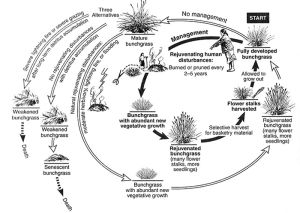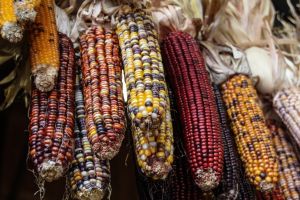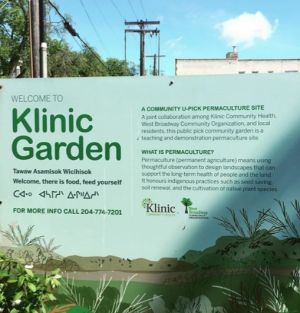Traditional Ecological Knowledge: Difference between revisions
Florez4747 (talk | contribs) |
Florez4747 (talk | contribs) |
||
| Line 31: | Line 31: | ||
The [[Klinic Garden]] is a permaculture 'U-Pick' community garden in Winnipeg, Manitoba in so called Canada, which utilizes Traditional Ecological Knowledge. The garden is led by [[Audrey Logan]] (many people call her ‘Auntie,') and she emphasizes a return to Indigenous place based gardening. The garden is open to the general public to pick any food or medicine freely; Auntie holds group gardening days typically once a week during the growing season, which allows the general public to learn about Indigenous permaculture while contributing to the garden- in this way the garden also serves as a [[knowledge commons]]. | The [[Klinic Garden]] is a permaculture 'U-Pick' community garden in Winnipeg, Manitoba in so called Canada, which utilizes Traditional Ecological Knowledge. The garden is led by [[Audrey Logan]] (many people call her ‘Auntie,') and she emphasizes a return to Indigenous place based gardening. The garden is open to the general public to pick any food or medicine freely; Auntie holds group gardening days typically once a week during the growing season, which allows the general public to learn about Indigenous permaculture while contributing to the garden- in this way the garden also serves as a [[knowledge commons]]. <br> | ||
Her teachings emphasize that many plants the general public consider weeds have medicinal value (for example thistle is good for liver cleansing, but is often considered a weed.) "Blood Knowledge" is another concept Auntie discusses through her teachings; Blood Knowledge is knowledge passed down to children through their mothers in the womb. Auntie emphasizes that everyone has knowledge about the Earth, plants, and ecology, but it has to be tapped into through experience. | Her teachings emphasize that many plants the general public consider weeds have medicinal value (for example thistle is good for liver cleansing, but is often considered a weed.) | ||
== Blood Knowledge == | |||
"Blood Knowledge" is another concept Auntie discusses through her teachings; Blood Knowledge is knowledge passed down to children through their mothers in the womb. Auntie emphasizes that everyone has knowledge about the Earth, plants, and ecology, but it has to be tapped into through experience. <br> | |||
Blood knowledge is a path towards true food sovereignty through the recognition that we are all potential stewards of the earth and can all contribute to the production of local healthy food. Auntie explains the concept of [[blood knowledge]] in her zine: | Blood knowledge is a path towards true food sovereignty through the recognition that we are all potential stewards of the earth and can all contribute to the production of local healthy food. Auntie explains the concept of [[blood knowledge]] in her zine: | ||
<blockquote> I want to make sure to claim the knowledge of what I learned on my own as being my own knowledge— to say that I didn’t have to live with her in the bush, to know all this stuff that’s already in my blood. So blood knowledge, as we now know, the DNA of our grandmothers are in us when our mothers carry us, and everyone has it, it’s in our DNA. So to acknowledge that instead of— she shared with me some stories, and I gathered some too, by following the old trade route trails unknowingly. | <blockquote> I want to make sure to claim the knowledge of what I learned on my own as being my own knowledge— to say that I didn’t have to live with her in the bush, to know all this stuff that’s already in my blood. So blood knowledge, as we now know, the DNA of our grandmothers are in us when our mothers carry us, and everyone has it, it’s in our DNA. So to acknowledge that instead of— she shared with me some stories, and I gathered some too, by following the old trade route trails unknowingly.<br> | ||
We have a lot of young kids, they have it in their genes, their blood, but if they don’t acknowledge it and if they think that they can’t get it because they haven’t gotten it through their ancestors that they could never meet because of a system of separation— that would be wrong. But they can actually hear their ancestors who are there with them, their voices— if they learn to listen. There are times when auntie speaks, when I hear her, and i’m like ‘whoah!’ And when I was younger that was called crazy. But now we know it’s not craziness, it’s connection.<Ref>http://www.nmfccc.ca/uploads/4/4/1/7/44170639/dehydration_nations_zine.pdf</Ref></Blockquote> | We have a lot of young kids, they have it in their genes, their blood, but if they don’t acknowledge it and if they think that they can’t get it because they haven’t gotten it through their ancestors that they could never meet because of a system of separation— that would be wrong. But they can actually hear their ancestors who are there with them, their voices— if they learn to listen. There are times when auntie speaks, when I hear her, and i’m like ‘whoah!’ And when I was younger that was called crazy. But now we know it’s not craziness, it’s connection.<Ref>http://www.nmfccc.ca/uploads/4/4/1/7/44170639/dehydration_nations_zine.pdf</Ref></Blockquote> | ||
= Sources = | = Sources = | ||
Revision as of 20:31, 3 June 2023
Summary
Traditional Ecological Knowledge has been employed by Indigenous Nations since time immemorial and provides a framework necessary to transition away from capitalism and industrial agriculture towards true Food Sovereignty. Winona LaDuke explains this concept:
"Minobimaatisiiwin," or the "good life," is the basic objective of the Anishinabeg and Cree people who have historically, and to this day, occupied a great portion of the north-central region of the North American continent. An alternative interpretation of the word is "continuous rebirth." This is how we traditionally understand the world and how indigenous societies have come to live within natural law. Two tenets are essential to this paradigm: cyclical thinking and reciprocal relations and responsibilities to the Earth and creation. Cyclical thinking, common to most indigenous or land-based cultures and value systems, is an understanding that the world (time, and all parts of the natural order-including the moon, the tides, women, lives, seasons, or age) flows in cycles. Within this understanding is a clear sense of birth and rebirth and a knowledge that what one does today will affect one in the future, on the return. A second concept, reciprocal relations, defines responsibilities and ways of relating between humans and the ecosystem. Simply stated, the resources of the economic system, whether they be wild rice or deer, are recognized as animate and, as such, gifts from the Creator. Within that context, one could not take life without a reciprocal offering, usually tobacco or some other recognition of the Anishinabeg's reliance on the Creator. There must always be this reciprocity. Additionally, assumed in the "code of ethics" is an understanding that "you take only what you need, and you leave the rest."[1]
Indigenous Food Sovereignty
Legacies of Indigenous Food Sovereignty offer many pathways to achieve food sovereignty for everyone on earth in a sustainable manner taking into account local environments and the affects of food production on said environments.[2]
Before colonization Indigenous Nations across Turtle Island were thriving civilizations[3] with complex societies and differing customs.[4][5][6]
In fact without the aid of The Wampanoag Nation some of the first settlers would not have been able to survive the winters and would have either starved or froze to death. The Wampanoag had a deep relationship with the land and the creatures they shared it with:
“We have lived with this land for thousands of generations—fishing in the waters, planting and harvesting crops, hunting the four-legged and winged beings and giving respect and thanks for each and every thing taken for our use. We were originally taught to use many resources, remembering to use them with care, respect, and with a mind towards preserving some for the seven generations of unborn, and not to waste anything.”[7]
There were many types of agriculture, means to sustenance and land management techniques across the so called Americas.[8][9] A common myth is that Indigenous Nations were barely surviving before European colonization and that Indigenous Nations lived within an untouched undisturbed landscape [10], but this is not accurate:
... “everyone would help themselves, eat when you are hungry, [there was] always food for everyone, and the fires never went out, the coals were always kept going… food was communal with a preference for the youth and elderly to eat first.” ...
“we need to get rid of this idea that we were barely getting by and starving. We had vast food reserves and never went hungry – there was much abundance.”[11]
Indigenous techniques of agriculture are typically rooted in a deep sense of place and understanding of the local environment- These techniques/considerations offer much guidance and a framework to transition away from the industrial agricultural system dominating the Earth today (Traditional Ecological Knowledge.)[12] Before European colonization many Indigenous Nations were already practicing sustainable regenerative agriculture, which have influenced many sustainable agriculture techniques in the status quo (agroecology/permaculture.) [13] The reality of advanced agriculture techniques flies in the face of the myth of settlers reaching a pristine untouched land; Indigenous Nations had been stewards over Turtle Island since time immemorial.
Indigenous Nations practiced regenerative agriculture in part to ensure that soils would be capable of continued food production for the future Seven Generations, but also because of a sense of responsibility/stewardship for the environment, which is in stark contrast of European conceptions of the world which revolve around domination and 'taming of the wild.'
Klinic Garden
The Klinic Garden is a permaculture 'U-Pick' community garden in Winnipeg, Manitoba in so called Canada, which utilizes Traditional Ecological Knowledge. The garden is led by Audrey Logan (many people call her ‘Auntie,') and she emphasizes a return to Indigenous place based gardening. The garden is open to the general public to pick any food or medicine freely; Auntie holds group gardening days typically once a week during the growing season, which allows the general public to learn about Indigenous permaculture while contributing to the garden- in this way the garden also serves as a knowledge commons.
Her teachings emphasize that many plants the general public consider weeds have medicinal value (for example thistle is good for liver cleansing, but is often considered a weed.)
Blood Knowledge
"Blood Knowledge" is another concept Auntie discusses through her teachings; Blood Knowledge is knowledge passed down to children through their mothers in the womb. Auntie emphasizes that everyone has knowledge about the Earth, plants, and ecology, but it has to be tapped into through experience.
Blood knowledge is a path towards true food sovereignty through the recognition that we are all potential stewards of the earth and can all contribute to the production of local healthy food. Auntie explains the concept of blood knowledge in her zine:
I want to make sure to claim the knowledge of what I learned on my own as being my own knowledge— to say that I didn’t have to live with her in the bush, to know all this stuff that’s already in my blood. So blood knowledge, as we now know, the DNA of our grandmothers are in us when our mothers carry us, and everyone has it, it’s in our DNA. So to acknowledge that instead of— she shared with me some stories, and I gathered some too, by following the old trade route trails unknowingly.
We have a lot of young kids, they have it in their genes, their blood, but if they don’t acknowledge it and if they think that they can’t get it because they haven’t gotten it through their ancestors that they could never meet because of a system of separation— that would be wrong. But they can actually hear their ancestors who are there with them, their voices— if they learn to listen. There are times when auntie speaks, when I hear her, and i’m like ‘whoah!’ And when I was younger that was called crazy. But now we know it’s not craziness, it’s connection.[14]
Sources
- ↑ http://www.uky.edu/~rsand1/china2017/library/NOTES/LaDuke%20-%20Traditional%20Ecological%20Knowledge%20-%20Notes.pdf
- ↑ Bethany Elliott, Deepthi Jayatilaka, Contessa Brown, Leslie Varley, Kitty K. Corbett, "“We Are Not Being Heard”: Aboriginal Perspectives on Traditional Foods Access and Food Security", Journal of Environmental and Public Health, vol. 2012, Article ID 130945, 9 pages, 2012. https://doi.org/10.1155/2012/130945
- ↑ https://fncaringsociety.com/sites/default/files/Indigenous%20Contributions%20to%20North%20America%20and%20the%20World.pdf
- ↑ Clement, R. M., & Horn, S. P. (2001). Pre-Columbian land-use history in Costa Rica: a 3000-year record of forest clearance, agriculture and fires from Laguna Zoncho. The Holocene, 11(4), 419–426.
- ↑ Graeber, D., & Wengrow, D. (2021). The dawn of everything: a new history of humanity. First American edition. New York, Farrar, Straus and Giroux.
- ↑ Keeler, K. (2022). Before colonization (BC) and after decolonization (AD): The Early Anthropocene, the Biblical Fall, and relational pasts, presents, and futures. Environment and Planning E: Nature and Space, 5(3), 1341–1360. https://doi.org/10.1177/25148486211033087
- ↑ https://www.nlm.nih.gov/nativevoices/timeline/200.html
- ↑ https://nfu.org/2020/10/12/the-indigenous-origins-of-regenerative-agriculture/
- ↑ https://www.cbpp.org/research/food-assistance/the-historical-determinants-of-food-insecurity-in-native-communities
- ↑ https://jan.ucc.nau.edu/~alcoze/for398/class/pristinemyth.html
- ↑ https://branchoutnow.org/growing-sovereignty-turtle-island-and-the-future-of-food/#comments
- ↑ Bethany Elliott, Deepthi Jayatilaka, Contessa Brown, Leslie Varley, Kitty K. Corbett, "“We Are Not Being Heard”: Aboriginal Perspectives on Traditional Foods Access and Food Security", Journal of Environmental and Public Health, vol. 2012, Article ID 130945, 9 pages, 2012. https://doi.org/10.1155/2012/130945
- ↑ https://nfu.org/2020/10/12/the-indigenous-origins-of-regenerative-agriculture/
- ↑ http://www.nmfccc.ca/uploads/4/4/1/7/44170639/dehydration_nations_zine.pdf


